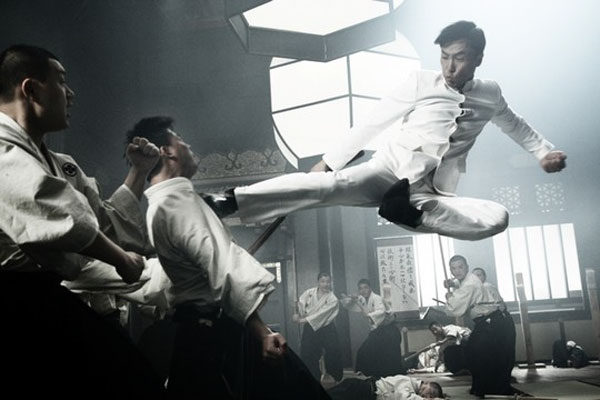A Fist of Fury, by David Bax

Andrew Lau’s Legend of the Fist: The Return of Chen Zhen is a continuation of a mid-90’s television series called Fist of Fury, which itself was a remake of the 1972 film Fist of Fury, starring Bruce Lee as Chen Zhen. The very talented Donnie Yen (Hero) returns to that role here after headlining in the television incarnation. That’s a complex history but it’s not nearly as convoluted as the plot of the film itself. And I’ll bet it was a lot more exciting.
Legend of the Fist concerns Chen Zhen’s return to China, Shanghai namely, after having fought in France in World War I. He’s living now under the name of one of his fallen comrades and pretending that Chen Zhen died in battle. The reason he desires a new identity is unclear in the movie but seems to have something to do with the events of the television series. The assumed name comes in handy, though, when he gets hired at a nightclub frequented by rich imperialists, be they British or Japanese. Now he can fight for his country without being suspected. Except that it seems like pretty much anyone of consequence knows that he’s Chen Zhen, the masked warrior (an identity he devises to protect a Chinese general from Japanese assassins in the film’s absolute best action scene). He’s not the only one going incognito, either. About half the people in the movie are undercover and 100% of them are really, really bad at it.
That’s only part of the confusion. The rest comes from a plot filled with double crossings of murky motivation and hastily sketched relationships that seem to spring up out of nowhere. The main thrust of the film is that the Japanese want to exploit divisions in China’s power structure and military in order to take over and occupy Manchuria. I hesitate to go too far into this because of my admitted scarcity of education about this particular bit of history and the film is not willing to help me along. Which makes sense, as it was made for a Chinese audience certainly more familiar than I am with Sino-Japanese relations in the 1920’s. And luckily, my complaints about the film have nothing to do with history.
The sum of things here is that this film is a piece of nationalism wherein Chen Zhen is not just China’s defender from the Japanese but a fierce advocate for the unification of all Chinese people. In addition to being an action film set against an historical backdrop, Legend of the Fist is also a tribute to those who stood up for their country and resisted both Japanese and Western imperialists. There are segments of the film dealing specifically with the workers and the students who protested met in secret to undermine outside influences. These sequences are important but sadly, they are also very thinly drawn, as are any other attempts to paint a picture of the time. It depicts with these resisters without exploring them, just as it does with the collaborators.
Much of the film’s action takes place at a Shanghai nightclub, named Casablanca in a stroke of subtlety. Just like Rick’s place in Michael Curtiz’s film, the nightclub is a place where political and cultural enemies seem to rub elbows, where tensions are high but everyone stays close to their best behavior in the interest of having a good time. Again, there are missed opportunities here. The owner is profiting as a result of his rich imperialist clientele but the movie doesn’t have the courage to keep him amoral and opportunistic. He, like every other character, definitively chooses a side and I’m using ‘definitively’ as an understatement. He can’t be impartial when he’s employing Chen Zhen, whom he seems to have become best friends with after knowing him for six or seven minutes. What would Casablanca be if Rick’s maitre d’ was going out every night and kicking Nazis in the head?
Kicking, however, is exactly where Legend of the Fist shines. The fights are exquisitely choreographed by Donnie Yen himself, managing to make satisfying spatial sense as well as being thrilling mini-stories told with confident grace and teeth-clenching brutality. Those accustomed to watching Jackie Chan fight in PG-13 Hollywood movies should brace themselves for a healthy dose of bloodshed, with blades eviscerating torsos and fists pulverizing faces and throats.
What really puts the finishing touch on these fights, which are too few and with way too much boring space in between them, is the accomplished photography by director/cinematography Andrew Lau. Lau brings to Legend of the Fist some of same still and assured grandeur that he lent to another film he shot and helmed, 2002’s Infernal Affairs, known on these shores as the original, superior version of The Departed. Comparisons to that film can only hurt this one, though.
Infernal Affairs may have also been prone to plot contrivances and some questionable logic but what set it apart is that, out of necessity to the plot, it treated the good guys and the bad guys with the same amount of care. They have not have always been the most believable characters but they were equals. Legend of the Fist, on the other hand, is such a bland and bombastic bit of near-propaganda that the Japanese are nothing more than ridiculous caricatures of evil. You can’t have lasting historical fiction without having respect for the nuances of history.






























